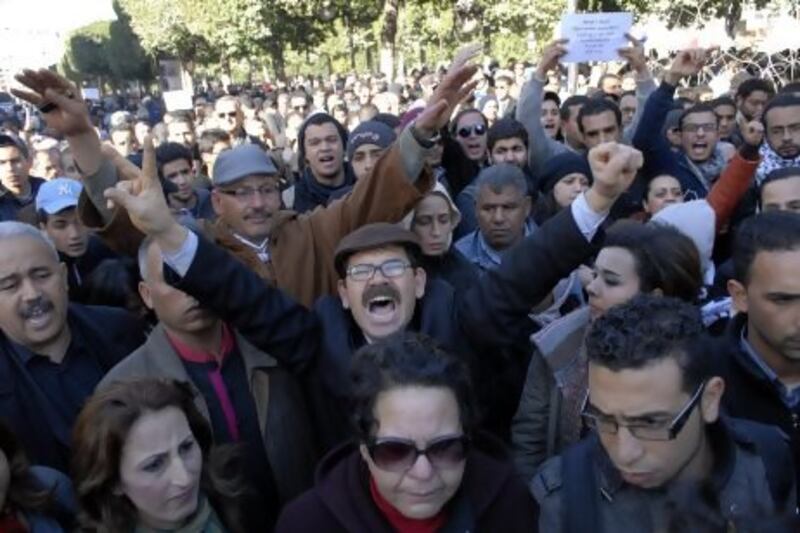The assassination yesterday of a prominent critic of Tunisia's Islamist-led government plunged the country into crisis.
Police fired tear gas at thousands of protesters in Tunis and four opposition parties called for a general strike and withdrew from the national assembly.
Chokri Belaid, the leader of the opposition Unified Democrat Patriots party, was shot four times at point-blank range as he left his home in Tunis yesterday morning, just days after he had made allegations that the ruling Ennahda party had "given the green light" to political assassinations.
His wife said her husband had received daily death threats and Belaid's family accused Ennahda of being behind the killing.
Ennahda's religious leader Rachid Ghannouchi said the assassination was an "ignoble crime" and it was impossible a ruling party would do such a thing, which would damage investment and tourism in a country struggling to overcome its economic woes.
Last night the prime minister Hamadi Jebali said he was dissolving the cabinet and forming a new government of technocrats. Elections will be held soon, he said.
The assassination is the first since an uprising more than two years ago forced out the autocratic president Zine El Abidine Ben Ali and ushered in a precarious new era of democracy, as an interim government dominated by moderate Islamists Ennahda has struggled to maintain stability.
Police used tear gas to disperse thousands of people who erected barricades, threw stones and rallied outside the interior ministry yesterday, some chanting the same slogan they used during protests two years ago: "The people want the fall of the regime!"
The four opposition parties demanded interior minister Ali Laraydeh's sacking, blaming him for Belaid's murder "because he knew he was threatened and he did nothing", said Nejib Chebbi, leader of one of the groups. The president, Moncef Marzouki, himself a member of a secular party that has clashed frequently with Ennahda, condemned the attack while speaking at the European Parliament in Strasbourg, France.
"This is a letter being sent to us that we will refuse to open. We reject that message and we will continue to unmask the enemies of the revolution," he said.
Mr Marzouki cancelled a trip to Cairo for an Organisation of Islamic Cooperation summit to return to Tunis early.
Political parties of all sides denounced the attack, including the Call of Tunisia party led by Beiji Caid Essebsi, who was a minister under Ben Ali and is closely associated with the former regime. Mr Essebsi has previously implicated the ruling party in the death of an official from his faction in the southern town of Tatouine.
At the more extreme Islamist end of the spectrum, Hizb ut Tahrir, a party staunchly to the right of Ennahda, issued a statement on its Facebook page calling Belaid's death a "political assassination" and "a crime".
Belaid's killing comes at a time of political fragility for Tunisia, and one in which political violence has been on the rise. Gangs of thugs calling themselves the Leagues for the Protection of the Revolution have been involved in attacks on anti-government protesters in recent months, and although no clear link has been shown between the gangs and Ennahda, many people believe firmly that the two are connected.
Belaid appeared on a television talk show on Monday night, alleging that Ennahda had approved political assassinations. The link to the clip had been shared almost 20,000 times on Facebook by late yesterday afternoon.
Human Rights Watch raised concerns in its annual worldwide report yesterday that intellectuals, artists, secularists and opponents of the Ennahda-led government were regularly subjected to threats or attacks that were rarely properly investigated.
During 2012, the group said, assaults were carried out by "individuals or groups who appeared to be motivated by a religious agenda". Police have proved "unwilling or unable to find or arrest the alleged attackers", the group said.
People in the towns of Sfax, Beja and Sidi Bouzid - where the uprising began in 2010 - reported that the local branches of Ennahda were being stormed by demonstrators. Local radio station Shems FM reported that major opposition parties had called for a general strike - an increasingly common way for Tunisians to express displeasure with the government - today.
* With reporting from the Associated Press, Agence France-Presse and Reuters





